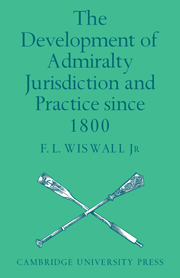Book contents
- Frontmatter
- Contents
- Preface and Acknowledgments
- List of Admiralty Judges
- Abbreviations and Symbols
- Table of Statutes
- Table of Cases
- Dedication
- INTRODUCTION
- 1 THE ERA OF STOWELL
- 2 THE COURT RESURGENT
- 3 THE FALL OF DOCTORS' COMMONS
- 4 THE GREAT TRANSITION
- 5 THE COURT UNDER COMMON LAWYERS
- 6 THE EVOLUTION OF THE ACTION in rem
- CONCLUSION
- Bibliography
- Index of Subjects
- Index of Persons
3 - THE FALL OF DOCTORS' COMMONS
Published online by Cambridge University Press: 07 October 2011
- Frontmatter
- Contents
- Preface and Acknowledgments
- List of Admiralty Judges
- Abbreviations and Symbols
- Table of Statutes
- Table of Cases
- Dedication
- INTRODUCTION
- 1 THE ERA OF STOWELL
- 2 THE COURT RESURGENT
- 3 THE FALL OF DOCTORS' COMMONS
- 4 THE GREAT TRANSITION
- 5 THE COURT UNDER COMMON LAWYERS
- 6 THE EVOLUTION OF THE ACTION in rem
- CONCLUSION
- Bibliography
- Index of Subjects
- Index of Persons
Summary
Doctors' Commons is situate in Great Knight-Rider-street, to the south of St Paul's Cathedral. It is the college of civilians, where the civil law is studied and practised, and derives its name from the civilians commoning together as in other colleges. Here are kept the courts which have cognizance of injuries of an ecclesiastical, military, and maritime nature.
So commences a description of that bastion of the civil law in England, given at the dawn of the nineteenth century by the most elegant of London's pictorial surveys. But in modern London the few yards of Knightrider Street which run along behind the College of Arms bear no traces whatever of the College of Civilians, and the name of Doctors' Commons has itself lain ghostly for more than a century.
What this august body was, how it came to be, and, more significantly, how it came to be dissolved, is intricately bound up with and essential to an understanding of the subsequent evolution of the Law and Court of Admiralty, for it literally was the Admiralty Court for hundreds of years. Moreover, ‘the part played by the doctors in … the development of maritime law … seems a topic of wider interest than anything they did as Canonists …’
As it is a natural concomitant of the existence of any profession that its practitioners associate themselves in some formal way, it is not surprising that those advocates in the courts of the civil law should have formed an association somewhat akin to the Inns of Court formed by their barrister counterparts at common law.
- Type
- Chapter
- Information
- Publisher: Cambridge University PressPrint publication year: 1971



